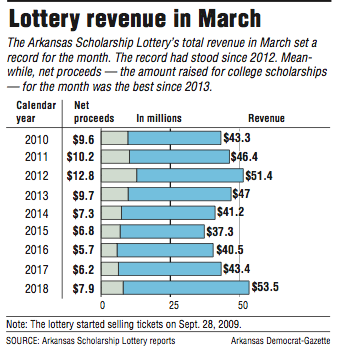Boosted by a Powerball jackpot hitting $456 million and a Mega Millions jackpot reaching $521 million, the Arkansas Scholarship Lottery's revenue totaled $53.5 million in March and exceeded the lottery's previous record set six years ago.
The amount raised for college scholarships last month reached $7.9 million -- the largest amount for March since $9.7 million was raised in 2013 -- the lottery reported this week in its monthly report to Gov. Asa Hutchinson and the Legislative Council's lottery oversight subcommittee. The total revenue March record was $51.4 million in 2012.
The lottery would have raised more for college scholarships last month "had it not been for a couple of larger prizes we had over the course of the month," lottery Director Bishop Woosley said Tuesday.
The lottery has been selling tickets since Sept. 28, 2009.
The amount that the lottery raises for scholarships -- called net proceeds -- helps fund the Arkansas Academic Challenge Scholarships. The scholarships also are funded with $20 million a year in state general revenue and a $20 million lottery reserve fund that is tapped to cover temporary cash shortfalls. The reserve fund is later replenished with lottery proceeds.
More than 30,000 students have received these scholarships during each of the past eight fiscal years. The Legislature has cut the size of the scholarships three times over a handful of years because net proceeds fell short of initial projections and more students than projected received the scholarships.
The state Department of Higher Education's latest projection is it will distribute about $88 million in scholarships in fiscal 2018, which ends June 30, instead of the $93.3 million projected before scholarships were awarded for the spring semester, said department spokesman Alisha Lewis.
The projection was reduced because of prorating senior award amounts based on their numbers of credit hours in their last semesters and because awards didn't go to some students who were initially projected to receive them, she said.
In fiscal 2017, the department distributed $86.2 million in scholarships, a drop from $96.5 million in fiscal 2016. For fiscal 2017, the eligibility standards were changed and the scholarship size for first-year students was cut by the 2015 Legislature.
The largest total monetary value of scholarships handed out in one year was $132.9 million distributed in fiscal 2013, the department has reported.
In 2017, the Legislature created another type of college assistance award, the Arkansas Workforce Challenge Scholarship program, to be financed with excess lottery proceeds.
Those scholarships of up to $800 a year are for students enrolled in programs that lead to qualification for jobs in high-demand occupations. They are to be distributed for the first time in the coming school year.
The lottery's report said that in March, scratch-off ticket revenue increased by $5.9 million over the same month a year ago to $42.8 million.
Woosley attributed the rising scratch-off ticket revenue to a handful of things.
March's scratch-off ticket launch occurred that month, instead of February like it did last year, and the lottery launched five games instead of four, he said. "Also, we had a wonderful family of games that included a $20 ticket," he said.
Draw game ticket revenue increased in March by $4.2 million over the same month a year ago to $10.6 million, the lottery reported.
During the first half of last month, "we had a Powerball jackpot and Mega Millions jackpot, which both approached or exceeded $500 million," Woosley said. "Sales from those two jackpot games account for the majority of the increase in draw game sales."
The lottery's revenue also includes fees paid by more than 1,900 retailers that totaled $65,693 last month.
In March, the lottery raised $7.9 million for college scholarships -- about $1.7 million more than a year ago -- the lottery reported.
Increased ticket sales boosted funds for college scholarships, and "the mix of sales was also helpful in that we often have a better profit margin from draw game sales," Woosley said.
March was the ninth month of fiscal 2018.
So far in fiscal 2018, revenue has reached $380.2 million, and that's the largest amount collected in the first three quarters of any fiscal year.
The previous record for that time period was $362.8 million in fiscal 2012.
Also in that same period, the lottery has raised $63.3 million for college scholarships, and that's the most since fiscal 2012, when $73.7 million was raised.
The lottery reported $765,836 in unclaimed prizes last month, increasing its unclaimed prize reserve fund to $6.51 million as of March 31.
Under state law, the reserve fund balance, minus $1 million, is transferred to scholarships.
Since Aug. 1 under a new state law, lottery retailers have been given the option of accepting debit cards as payment for ticket purchases. State law previously limited retailers to accepting cash only.
Woosley said the lottery intends "soon to complete a comprehensive survey" to determine the number of retailers accepting debit cards.
In fiscal 2018, Woosley has projected the lottery's revenue at $459 million and its net proceeds at $83.6 million.
The lottery's revenue and net proceeds peaked at $473 million and $97.5 million, respectively, in fiscal 2012 before dropping each of the next three fiscal years.
Net proceeds rebounded in fiscal 2016 and 2017.
Asked whether he expects the lottery to break records for revenue and net proceeds for fiscal 2018, Woosley said, "At this point, I am focused on maintaining where we are versus budget for the rest of the fiscal year. We just want to raise as much as possible for scholarships."
Metro on 04/11/2018


